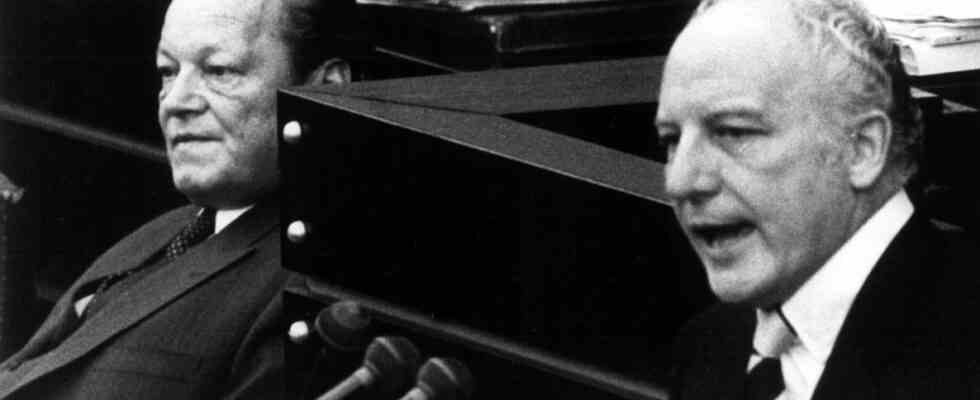There was once a smoky, highly popular Sunday morning program on German television called “Der Internationale Frühschoppen”, where many an explosive topic was discussed with journalists from all over the world (it still ekes out a shadowy existence as a “press club” today). Hartmut Palmer, then reporter of the Süddeutsche Zeitung and author of the book at issue here, was invited because Franz Josef Strauss, the muscle man and then top Howler Monkey of the CSU, had called him a “gangster journalist”. When asked about it, Palmer said: Actually, Strauss is absolutely right, because a political journalist writes about politics, a cultural journalist about culture and a gangster journalist about gangsters.
Even knowing its crevices and chasms, Palmer would never have dreamed that decades later he would plumb completely different abysses of the political figure Strauss. And what a prophecy, the former gangster journalist has created this in a crime novel. “Verrat am Rhein” is an agent’s and robber’s pistol, the core of which deserves the rank of a serious documentary about the circumstances, course of events and motives of a colossal affair: the failed constructive vote of no confidence against Chancellor Willy Brandt in April 1972, i.e. 50 years ago.
Strauss and Barzel didn’t really like each other
It was about Brandt’s, West Germany’s then new, outrageous policy of détente towards the German and geopolitical East, which today is undisputedly the basis of “change through rapprochement”, decades of peace in the Cold War and ultimately the regained German unity. At the time, the CDU/CSU under opposition leader Rainer Barzel hoped to bring down the social-liberal coalition, especially since conservative Social Democrats and nationalist FDP MPs had turned their backs on their respective parties, an existential threat to the thin majority of the Brandt-Scheel coalition. Intrigue and bribery meant that the attack failed in a memorable and stirring vote on April 27, 1972, to the great surprise of all those involved and the German public at large. She announced Barzel’s political downfall, in the spirit of CSU chairman Franz Josef Strauss, who always treated the CDU chairman with contempt and meanness, according to a score that has been eerily re-enacted today – in the most recent federal election campaign.
The Stasi was involved
First there was the seemingly unequivocal diagnosis that the SPD had paid for Christian Democratic dissidents. Only a short time later, one of them, the CDU backbench Julius Steiner, confessed that he had been hired as an agent of the East German state security service. Somehow nobody wanted to hear that at the time, as they believed they had found a suitable perpetrator in Karl Wienand, the managing director of the SPD parliamentary group, without this ever being really proven. It wasn’t until the 1990s that it became fairly clear, not least through the confessions of the former GDR defense chief Mischa Wolf, that the Stasi was actually behind all of this – apparently at the instigation of Strauss.
Villain on the Rhine? CSU chairman Franz Josef Strauss (right) and Richard Stücklen (CSU) on May 17, 1972 during the debate on the Eastern treaties in the Bundestag in Bonn.
(Photo: dpa)
To have all of this explained in detail would be an incredibly exciting story in itself, at least for those who consciously experienced the turbulent, emotionally charged, historical epoch. Palmer takes the “anniversary” of this epoch-making affair as an opportunity for a meticulous presentation. He witnessed everything himself, as a young reporter for the Cologne City Gazette. The protagonist of the novel, an old warhorse of reporters named Zink, also has autobiographical overtones. As one of the most precise and persistent researchers among German journalists (after the SZ mainly at mirror), Palmer does not quite believe in the radiance of this seemingly historically distant time. He weaves an agent and gangster story unfolded by Zink, which begins with the end of the war and develops into a web in the tension of the German division and its entanglements and tragedies, which follows the circumstances, twists and turns of the German East-West relations as if by the way .
Hartmut Palmer: Betrayal on the Rhine. Kurt Zink and the vote of no confidence against Willy Brandt. Novel. Gmeiner-Verlag, Meßkirch 2022. 411 pages, 17 euros. E-book: 12.99 euros.
Palmer has managed to pull together a thriller and a documentary between two book covers. However, this has met with a divided readership. Those who are historically oriented get the political and personal tangle of that affair unraveled with an exciting wealth of detail and depth of interpretation. Then there are the younger semesters, to whom the political core could seem as fictitious as its coat, the agent, mix-up and murder story.
There is no proof for the thesis, but almost
In all the layers of facts and conclusions, Palmer identifies the populist and political villain Strauss as the actual mastermind of the affair, in thorough research and the enactment of the processes of that vote and its thunderous reverberations. He cannot prove Strauss’ betrayal. But Palmer doesn’t fool anyone about the credibility and provability of his thesis either. He plays with completely open cards, which he explains again in the epilogue. Rainer Barzel himself confided in him shortly before his death that one of the decisive abstentions from the CDU/CSU in the decisive vote was with absolute certainty Strauss himself, just to keep him, Barzel, away from the chancellery, for which the CSU boss alone thought capable and chosen.
Those familiar with the times and the protagonists are now convinced that there could be a compelling logic inherent in this genealogy of failure, which we are fortunate to see today. “Betrayal on the Rhine” is a politically explosive text framed in a criminally entertaining way.

